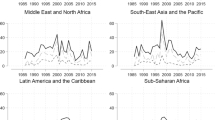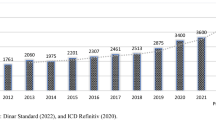Abstract
This paper discusses the impact of religious culture on micro financial decisions. Data concerning the religious beliefs of Chinese respondents was collected in 2007. We analyzed the data for the potential influence of religious beliefs on household borrowing decisions. By applying the ordered logit regression methods and IV estimator, we found that respondents with a religious family background borrowed less when other conditions remained unchanged. It was also discovered that, compared with non-believers, Buddhists borrow less than adherents of other religions. No other religious beliefs had a statistically significant influence. That is to say, different religious denominations exert different influences on Chinese household borrowing decisions.

Similar content being viewed by others
References
Acemoglu, D. (2009). Introduction to modern economic growth (pp. 110–141). Princeton: Princeton University Press.
Benjamin, D. J., Choi, J. J., & Fisher, G. W. (2010). Religion identity and economic behavior. NBER Working Paper No. 15925.
Deaton, A. S. (2009). Aging, religion, and health. NBER Working Paper No. 15271.
Dehejia R., DeLeire, T., Luttmer, E. F. P., & Mitchell, J. (2007). The role of religious and social organizations in the lives of disadvantaged youth. NBER Working Paper No. 13369.
Fisman, R., Paravisini, D., & Vig, V. (2012). Cultural proximity and loan outcomes. NBER Working Paper No. 18096.
Fletcher, J., & Kumar, S. (2013). Religion and risky health behaviors among U.S. adolescents and adults. NBER Working Paper No. 19225.
Freeman, R. B. (1985). Who escapes? The relation of church-going and other background factors to the socio-economic performance of black male youths from inner-city poverty tracts. NBER Working Paper No. 1656.
Gruber, J. (2005). Religious market structure, religious participation, and outcomes: Is religion good for you? NBER Working Paper No. 11377.
Guiso, L., Sapienza, P., & Zingales, L. (2003). People’s opium? Religion and economic attitudes. Journal of Monetary Economics, 50(1), 225–282.
Hilary, G., & Hui, K. W. (2009). Does religion matter in corporate decision making in America? Journal of Financial Economics, 93(3), 455–473.
Horioka, C. Y. (2014). Are Americans and Indians more altruistic than the Japanese and Chinese? Evidence from a new international survey of bequest plans. Review of Economics of the Household, 12(3), 411–437.
Hummer, R. A., Rogers, R. G., Nam, C. B., & Ellison, C. G. (1999). Religious involvement and U.S. adult mortality. Demography, 36(2), 273–285.
Hungerman, D. M. (2011). Do religious proscriptions matter? Evidence from a theory-based test. NBER Working Paper No. 17375.
Keister, L. A. (2008). Conservative protestants and wealth: How religion perpetuates asset poverty. American Journal of Sociology, 113(5), 1237–1271.
Kumar, A., Page, J. K., & Spalt, O. G. (2011). Religious beliefs, gambling attitudes, and financial market outcomes. Journal of Financial Economics, 102(3), 671–708.
Lehrer, E. L. (2009). Religion, human capital investments and the family in the United States. IZA Discussion Papers, No. 4279.
Liu, X. H., & Zhou, H. (2012). Individual family characteristics affect residents’ borrowing behavior—Empirical evidences from Chinese families. Journal of Financial Research, 379(1), 154–166.
Marx, K. (1859). A contribution to the critique of political economy. New York: International Publishers. (reprint. 1979).
Neal, L. (1990). The rise of financial capitalism. Cambridge: Cambridge University Press.
Renneboog, L., & Spaenjers, C. (2012). Religion, economic attitudes, and household finance. Oxford Economic Papers, 64, 103–127.
Ruan, R. P., & Wang, B. (2011). Religious faith and trust in the differentiated model of association: The empirical evidence from 10 cities in China. Chinese Journal of Sociology, 31(4), 195–217.
Ruan, R. P., Zheng, F. T., & Liu, L. (2014). Religious believing and social conflict: Origin or instrument? China Economic Quarterly, 13(2), 793–816.
Smith, A. (1776). The wealth of nations (Bantam Classics). New York: Random House.
Stulz, R. M., & Williamson, R. (2003). Culture, openness, and finance. Journal of Financial Economics, 70, 313–349.
Weber, M. (1930). The protestant ethic and the spirit of capitalism. London: Taylor & Francis Group.
Author information
Authors and Affiliations
Corresponding author
Rights and permissions
About this article
Cite this article
Chunping, Z., Li, P. & Lingwei, S. Do religious beliefs affect borrowing behavior? Evidence from Chinese households. Rev Econ Household 14, 989–1005 (2016). https://doi.org/10.1007/s11150-016-9324-2
Received:
Accepted:
Published:
Issue Date:
DOI: https://doi.org/10.1007/s11150-016-9324-2




